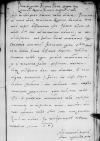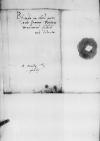List #2677
Bona Sforza do Ioannes DANTISCUSWielowieś, 1543-11-08
| odebrano Heilsberg (Lidzbark Warmiński), 1543-12-04 Rękopiśmienne podstawy źródłowe:
Publikacje:
| ||||||||||
Tekst + aparat krytyczny + komentarz Zwykły tekst Tekst + komentarz Tekst + aparat krytyczny
Reverendo in Christo Patri, domino
Reverende in Christo Pater, sincere nobis dilecte.
Pervenit ad aures nostras
Quae bene valeat.
Ex
Ad mandatum proprium sacrae reginalis maiestatis


 BCz, 1601, p. 714
BCz, 1601, p. 714